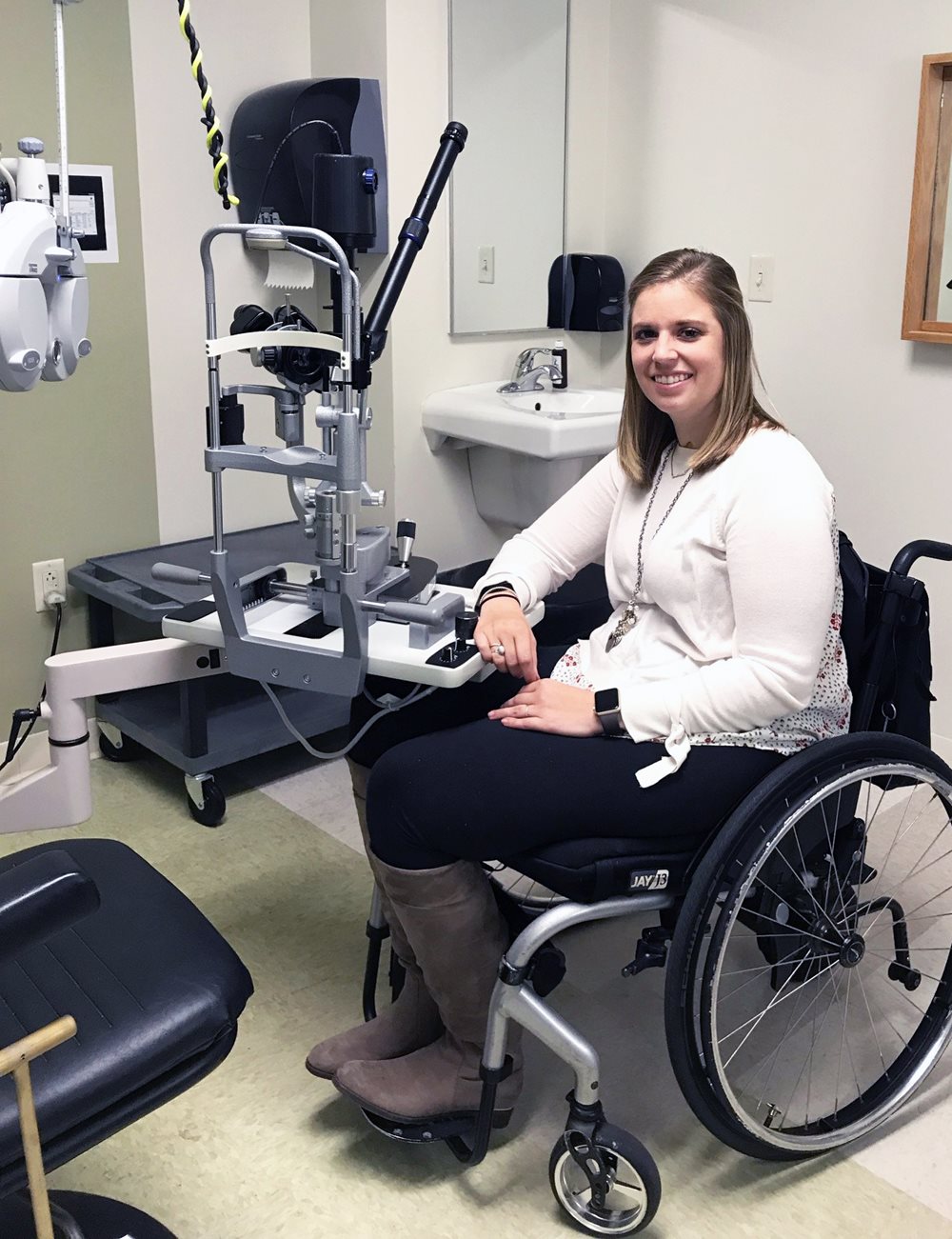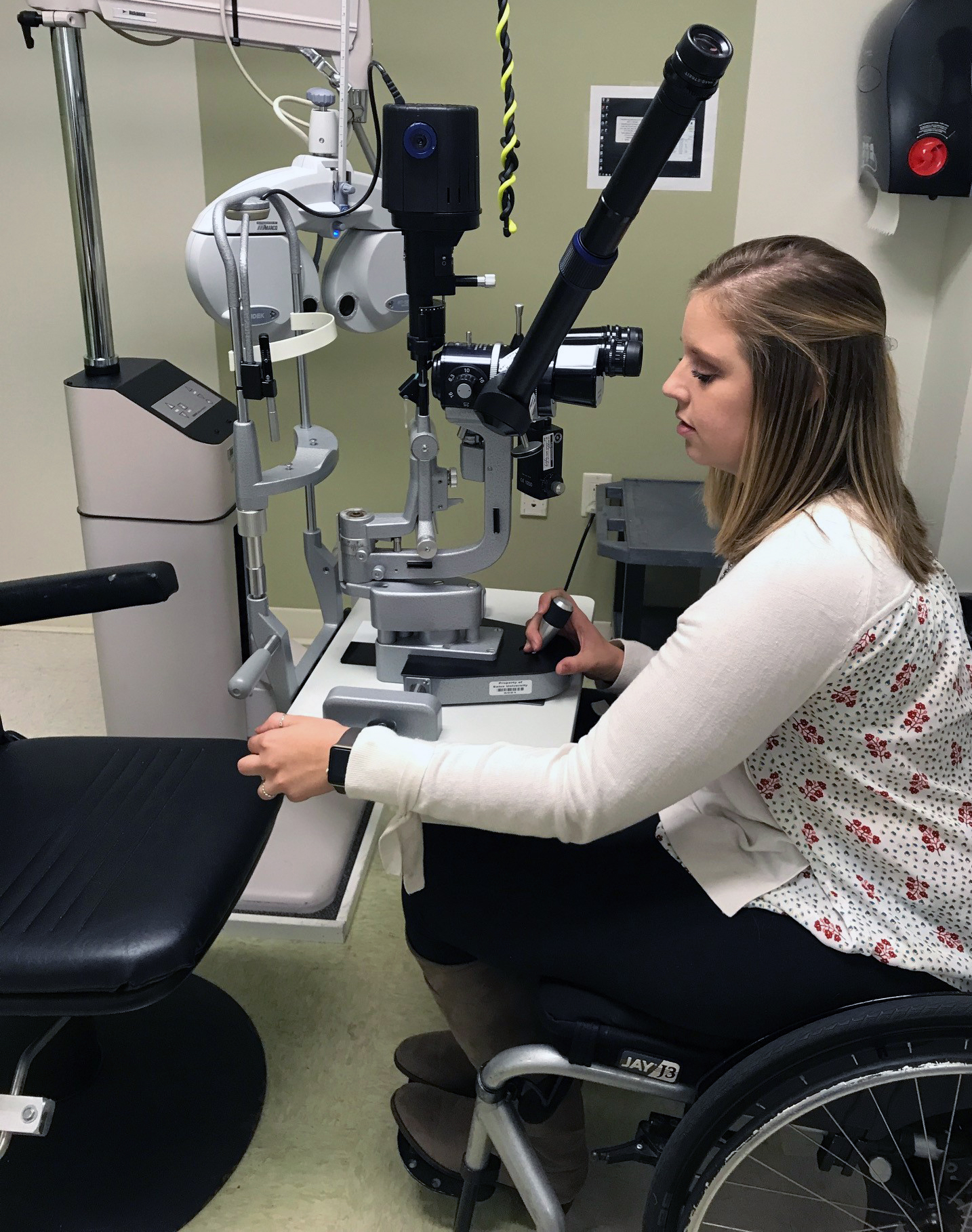Student Inspires New Handicap Accessible Equipment at TEI
 The Eye Institute (TEI) recently installed new specialized equipment that will allow vision exams to be easier for those with disabilities. One of the exam rooms, which was already handicap accessible for patients, is now handicap accessible for doctors as well.
The Eye Institute (TEI) recently installed new specialized equipment that will allow vision exams to be easier for those with disabilities. One of the exam rooms, which was already handicap accessible for patients, is now handicap accessible for doctors as well.
The new additions include motion-sensing trash cans, a customized chair for patient exams and an extended handle to reach overhead equipment. Also added was a special three piece system that will allow doctors to read and estimate a patient’s prescription and determine the refraction without having to maneuver a wheelchair to manually change the lenses.
The upgrades were inspired by 26-year-old Kelly Morse, ’19OD. Morse, assigned to her clinical rotation during her final year at TEI, is a fourth year Doctor of Optometry student at Salus University’s Pennsylvania College of Optometry. However just two years ago, she found herself in a very different place - in the intensive care unit of her local Virginia hospital.
“I was here at school, and I thought I just came down with the flu or something. When I wasn’t getting any better and my fever wasn’t breaking, I went home and within five days of onset, I ended up paralyzed from the nose down,” said Morse.
Morse started out with what she thought were flu-like symptoms but in a matter of days, her condition worsened and she found herself in the fight of her life. She underwent a round of tests, and while some of her symptoms began to subside over time, she ws left partially paralyzed and doctors were unable to determine the exact cause.
“I think the consensus now is that it was some kind of virus, probably mosquito born, and that was just how my body reacted to it,” she said. “My body basically attacked its whole central nervous system.”
Morse was forced to take time off from school but after a year, she was able to start taking classes remotely.
“My professors really helped me,” she said. “My last semester of school was completely online. I think I was one of the first students to do everything remotely. I got off my yearlong leave of absence and slowly worked in the classes, and then it was time for clinic.”
 After another year, Morse found herself back on campus at Salus ready to begin her clinical rotation. The only problem - she wasn’t sure how to accommodate for her wheelchair.
After another year, Morse found herself back on campus at Salus ready to begin her clinical rotation. The only problem - she wasn’t sure how to accommodate for her wheelchair.
Fortunately a team from TEI and Salus University stepped in and installed specialized equipment with Morse in mind.
“The Eye Institute, facilities and maintenance have all been incredible. I was really impressed with how fast they got everything done and how innovative they have been,” she said.
Morse says one of the biggest obstacles was finding an exam chair that allowed her to reach the patient and conduct the appropriate tests while seated in her wheelchair.
“Facilities found one in storage. Usually you have to use your foot to raise and lower the chair but they rigged it with a handle so that I don’t have to lean over, I can just use my hand,” she said.
Prior to the upgrades, Morse needed the assistance of another student in order to reach certain equipment. Now she is able to complete full exams all on her own.
“I feel extremely independent and am amazed at how much of a difference all of the changes made,” she said. “I feel like I’m back in my element, where I belong, doing what I love again.”